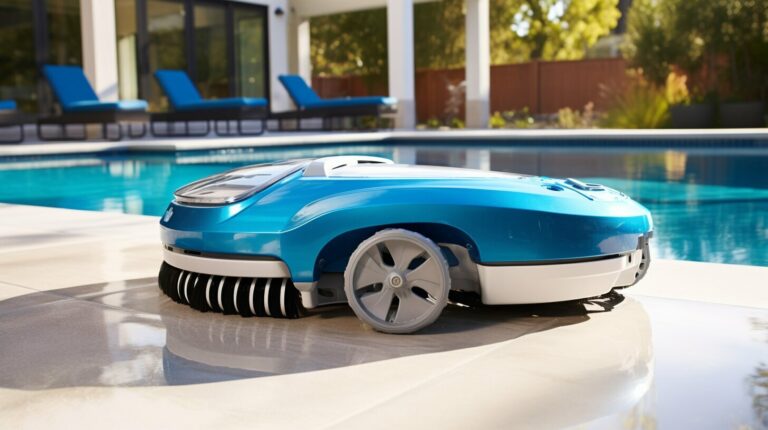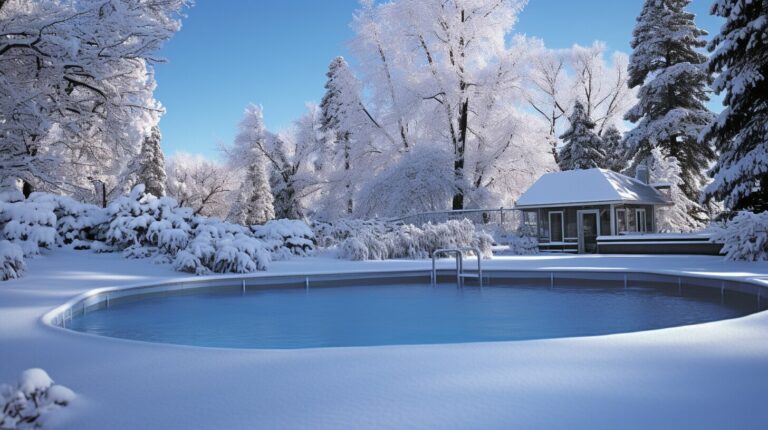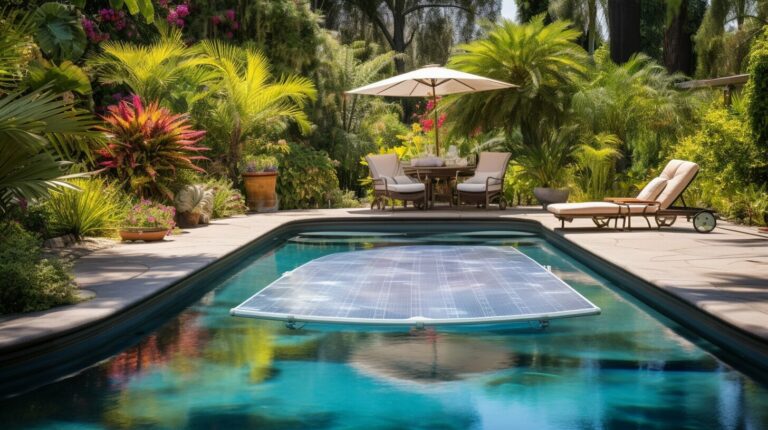Can You Heat A Salt Water Pool? Best Ways for 2023
Can You Heat A Salt Water Pool
Can you heat a salt water pool? Let’s get right to it – yes, like freshwater pools, saltwater pools can also be warmed to your desired temperature. This article will discuss the various heating options available for saltwater pools and how they can enhance your swimming experience.
So, if you’re ready to dive into some cozy warm waters in a saltwater pool – keep reading!
Key Takeaways
- Saltwater pools can be heated using solar heaters, heat pumps, and gas or propane heaters.
- Use a sacrificial Anode to prevent salt damage to pool systems
- Choosing a heater specifically rated for saltwater use and made with corrosion-resistant materials like titanium or cupronickel is important.
- Heating a saltwater pool extends the swimming season, provides a comfortable swimming experience, and creates a relaxing environment.
The Benefits of a Sacrificial Anode in a Salt Water Pool’s Skimmer
Add a sacrificial anode to your shopping list before we get to the rest of the article. Often overlooked, this is cheap insurance to protect the longevity of your saltwater system!
Sacrificial anodes, made of a more reactive metal like zinc or magnesium, protect your pool’s essential parts from salt water’s corrosive effects. When installed in the skimmer, these anodes degrade over time instead of components like your pool heater, ladders, and pump equipment. Our link is to a simple anode you can place in the skimmer, but you can also add them to your plumbing system when building a new pool.
This sacrificial process results from galvanic corrosion, where the anode, a more ‘sacrificial’ metal, corrodes before other metals in the system. So, by including a sacrificial anode in your saltwater pool’s skimmer, you can significantly extend the life of your pool’s key components, resulting in fewer maintenance issues and cost savings in the long run.
Can You Heat A Salt Water Pool? Pool Heating Options

– Solar heaters, heat pumps, and gas or propane heaters are all viable options for heating saltwater pools.
Solar Heater
 Heating your saltwater pool with a solar heater is not only an eco-friendly option, but it’s also highly cost-effective. This pool heating system harnesses the sun’s renewable energy to warm your swimming water, drastically cutting down on monthly utility expenses.
Heating your saltwater pool with a solar heater is not only an eco-friendly option, but it’s also highly cost-effective. This pool heating system harnesses the sun’s renewable energy to warm your swimming water, drastically cutting down on monthly utility expenses.
Solar heaters are compatible with traditional and salt chlorine generation pools, showing excellent performance even in pools with a high salt concentration of 3,500 PPM. Plus, they’re known for their longevity – most solar heaters can last up to two decades or more if properly maintained! So if you’re looking for a sustainable way to keep your pool cozy while saving money in the long run, installing a solar heater could be just what you need.
Heat Pump
 Heat pump heaters are extremely cost-effective and efficient for heating your saltwater pool. Typically, these devices use a small amount of energy to move heat from one place to another, making them ideal for warmer climates.
Heat pump heaters are extremely cost-effective and efficient for heating your saltwater pool. Typically, these devices use a small amount of energy to move heat from one place to another, making them ideal for warmer climates.
Heat pumps have titanium heat exchangers, which are impervious to damage from elements like salt or chlorine, ensuring long-lasting durability with regular maintenance.
Whether you own a freshwater or a saltwater pool, heating solutions like the heat pump work effectively in both scenarios, these assets provide fantastic energy savings of up to 70%, especially when compared with natural gas or propane-powered heaters.
So if optimizing your swimming season while keeping costs low is on your agenda, consider investing in a reliable heat pump system for your saltwater pools.
Gas or Propane Heater
 Gas or propane heaters provide a quick and effective way to heat your saltwater pool. These systems function by circulating the pool’s water through a filter, which is then warmed up before getting led back into the pool.
Gas or propane heaters provide a quick and effective way to heat your saltwater pool. These systems function by circulating the pool’s water through a filter, which is then warmed up before getting led back into the pool.
Brands like Hayward Pools offer an array of gas heaters in various sizes suitable for both natural gas and propane. It’s vital to note that these heaters need to be specifically designed for use with saltwater pools, as corrosion could be a concern otherwise.
Careful consideration should also be given to their safety and efficiency when choosing. With these robust devices, you can relish warm waters even during cooler months, extending your swimming season significantly!
Compatibility of Pool Heaters with Saltwater
 Ensure the heater is rated for saltwater and made with materials like titanium or cupronickel.
Ensure the heater is rated for saltwater and made with materials like titanium or cupronickel.
Ensuring the heater is rated for saltwater
 It’s important to ensure that the heater you choose for your saltwater pool is specifically rated for use in a saltwater environment. This ensures that the heater is designed to handle the increased salinity and won’t be damaged by prolonged exposure to saltwater.
It’s important to ensure that the heater you choose for your saltwater pool is specifically rated for use in a saltwater environment. This ensures that the heater is designed to handle the increased salinity and won’t be damaged by prolonged exposure to saltwater.
Look for heaters with materials such as titanium or cupronickel, which are corrosion-resistant and can withstand the harsh conditions of a saltwater pool. By choosing a heater compatible with saltwater, you can ensure its longevity and optimal performance for heating your pool water.
Materials such as titanium or cupronickel
 Pool heaters for saltwater pools need to be made with specific materials that can withstand the corrosive effects of salt. Common materials used in pool heaters for saltwater pools include titanium and cupronickel.
Pool heaters for saltwater pools need to be made with specific materials that can withstand the corrosive effects of salt. Common materials used in pool heaters for saltwater pools include titanium and cupronickel.
Due to its corrosion resistance, titanium is considered the best material for pool heaters in saltwater pools. It is known for maximum heat transfer and being resistant to saltwater and chemical corrosion.
Cupronickel is an upgraded exchanger material suitable for pools with increased salt levels. These materials ensure that your pool heater remains durable and efficient even in a harsh saltwater environment, providing a year-round comfortable swimming experience.
Benefits of Heating a Saltwater Pool
 – Heating a saltwater pool provides several benefits for pool owners.
– Heating a saltwater pool provides several benefits for pool owners.
– It allows them to enjoy a comfortable swimming experience regardless of the outside temperature.
– With a heated saltwater pool, they can extend the swimming season and make the most of their investment.
– Additionally, heating a saltwater pool creates a relaxing environment, perfect for unwinding after a long day.
Enjoying a comfortable swimming experience
Saltwater pools offer a comfortable swimming experience for pool owners. Unlike traditional chlorine pools, the lower chlorine levels in saltwater pools are gentler on your eyes and skin, making spending long hours in the water more enjoyable.
Regular swimming in chlorinated pools can increase the risk of lung inflammation in young children, but with a saltwater pool, you can have peace of mind knowing that the water is fresh and sanitary.
The saltwater chlorine generation also results in fewer chloramines, which cause that unpleasant feeling and smell often associated with swimming pools. So dive into your saltwater oasis and indulge in a truly comfortable swim!
Extending the swimming season
One of the benefits of heating a saltwater pool is that it allows you to extend the swimming season. As the weather cools down, many traditional chlorine pools become too chilly for comfortable swimming.
However, using a pool heater in your saltwater pool allows you to enjoy warmer water even during cooler months. This means that you and your family can continue to enjoy your backyard oasis for longer throughout the year.
With options like heat pumps or solar heaters, you can find a heating method that suits your budget and your desired temperature range. So don’t let the changing seasons limit your pool time – keep the fun going with a heated saltwater pool!
Creating a relaxing environment
Swimming in a saltwater pool provides you with all the benefits of regular swimming and creates a truly relaxing environment. The salt content in the water can promote your body’s natural relaxation process, making your swim even more enjoyable and soothing.
Additionally, saltwater pools have softer water, which feels gentle on your skin and eyes, creating a more comfortable experience overall. With their hypoallergenic properties and higher-quality chlorine, saltwater pools are the perfect choice for anyone looking to unwind and relax while taking a refreshing dip.
Maintaining a Saltwater Pool Heater
 Regular maintenance and cleaning of your saltwater pool heater is essential to ensure optimal performance and longevity. This includes monitoring for any signs of corrosion, checking the heating elements, and cleaning or replacing filters as needed.
Regular maintenance and cleaning of your saltwater pool heater is essential to ensure optimal performance and longevity. This includes monitoring for any signs of corrosion, checking the heating elements, and cleaning or replacing filters as needed.
Keep your saltwater pool heater running smoothly with proper maintenance practices. Learn more about how to maintain your saltwater pool heater here.
Regular maintenance and cleaning
Maintaining and cleaning your saltwater pool is essential for keeping it in optimal condition. While saltwater pools require less maintenance than traditional chlorine pools, regular upkeep is still necessary.
This includes testing and balancing the pool’s chemicals to ensure proper water chemistry. Also, your weekly routine should include spot cleaning with a skimmer net and vacuuming.
To keep your pool looking its best, it’s also recommended to give it a daily clean. Checking the salt chlorinator cell regularly is crucial for ensuring proper chlorine production, and annual boosters may be needed to replace lost salt due to backwashing or splash-out.
Monitoring for any signs of corrosion
 Regularly monitoring your saltwater pool for signs of corrosion is crucial to maintaining its longevity and functionality. Corrosion can occur in the pool equipment and filters, leading to costly repairs or replacements.
Regularly monitoring your saltwater pool for signs of corrosion is crucial to maintaining its longevity and functionality. Corrosion can occur in the pool equipment and filters, leading to costly repairs or replacements.
Keep an eye out for any rusted or corroded parts, such as metal fixtures or pipes, as these may indicate a problem. Additionally, inspect the salt cell every 2-3 months for calcium buildup that can affect its performance.
By promptly addressing any signs of corrosion, you can ensure that your pool remains in optimal condition and provide a safe swimming environment for you and your family.
Common FAQs about Heating Saltwater Pools
 – Can a saltwater pool be heated? Find out the different options available for heating your saltwater pool and how it can enhance your swimming experience.
– Can a saltwater pool be heated? Find out the different options available for heating your saltwater pool and how it can enhance your swimming experience.
– What are the risks of using a pool heater with a saltwater pool? Understand the compatibility of various heaters with saltwater and learn how to ensure proper maintenance to avoid potential risks.
– Is special maintenance required for a saltwater pool heater? Discover the necessary steps to maintain and clean your saltwater pool heater, ensuring its longevity and efficiency.
Read on to get all your questions answered about heating your saltwater pool!
Can a saltwater pool be heated?
Saltwater pools can be heated! Just like traditional chlorinated pools, saltwater pools can be equipped with various heating options, such as gas heaters, solar heaters, and heat pumps.
The saltwater chlorinator used in these pools does not affect the efficiency or compatibility of the heating units. It’s important to ensure that the pool heater is rated for saltwater and has materials like titanium or cupronickel to resist corrosion from the saline water.
With proper maintenance and monitoring of water chemistry levels, you can enjoy a comfortable swimming experience in your heated saltwater pool all year round.
What are the risks of using a pool heater with a saltwater pool?
Using a pool heater with a saltwater pool does come with some risks. The corrosive nature of saltwater can damage certain types of heaters, especially older models that may not be designed to handle the high salt content.
This corrosion can lead to costly repairs or even the need for replacement. It’s important to choose a heater that is specifically rated for use with saltwater pools and made from materials like titanium or cupronickel, which are more corrosion-resistant.
Also, maintaining proper water chemistry balance in your pool is crucial for preventing damage to any pool heater, so regular testing and adjustments are necessary.
Is special maintenance required for a saltwater pool heater?
Regular maintenance is essential for a saltwater pool heater to ensure longevity and proper functioning. It’s important to regularly clean the heater and monitor for any signs of corrosion, which the increased conductivity in the water from saltwater can cause.
Proper water chemistry, including pH and calcium hardness levels, should also be maintained to prevent damage to the heater. Special attention should be given to inspecting and cleaning the heat exchanger and checking and replacing worn-out parts if necessary.
These simple maintenance steps allow you to enjoy heated swimming in your saltwater pool without any hassles or unexpected breakdowns.
Conclusion
In conclusion, it is possible to heat a saltwater pool. Whether you choose solar, gas, propane, or heat pump heaters, various options are available that are compatible with saltwater chlorine generators.
By heating your saltwater pool, you can enjoy a comfortable swimming experience and extend the swimming season in any climate. Don’t let misconceptions stop you from enjoying the benefits of a warm and relaxing saltwater pool!
More FAQs
- Is it possible to heat a saltwater pool? Saltwater pools can be heated just like traditional chlorine pools.
- What heater types are suitable for warming up my saltwater pool? Gas pool heaters and electric pool heat pumps can heat your saltwater pool effectively. Gas heaters provide quick, powerful heat, while electric heat pumps are more energy-efficient, making them more cost-effective over time.
- Are there any other methods to heat a saltwater pool? Yes, there are eco-friendly methods available, such as solar heating systems. Solar panels, blankets, and even liquid solar pool covers can harness the sun’s rays to warm your pool. These methods are quite effective during the sunny pool season, especially for pools exposed to ample sunlight.
- Is it safe to swim in a heated salt water pool? Swimming in a heated salt water pool is safe, provided the water temperature is kept comfortable and within the recommended range of 78-82 degrees Fahrenheit. Regularly monitoring the temperature and maintaining a balanced level of chemicals is vital for swimmers’ safety.
- Does heating affect the salinity of a salt water pool? Heating a salt water pool doesn’t directly alter its saline levels. However, evaporation might occur during heating, causing minor changes in salinity concentration. Regular testing and maintenance will help uphold appropriate salinity levels.
- How does the salt water system work when heating the pool? The salt water system, or salt chlorine generator, uses salt molecules (sodium chloride) in the water to create its own chlorine. The heating element, whether gas, electric, or solar, raises the pool water temperatures. The salt system continues to function effectively at these elevated temperatures.
- What’s the average cost of heating a salt water pool? The average cost can vary greatly based on the size of your pool, your preferred temperature, the type of heating system used, and the local climate. Generally, gas heaters have higher operating costs than heat pump pool heaters, while solar systems can provide significant cost savings over time.
- What’s the ideal temperature for a heated salt water pool? The ideal temperature for any pool, including salt water pools, tends to be between 78-82 degrees Fahrenheit. This range provides a comfortable swimming environment without causing excessive heat loss or evaporation.
- Can I use a solar cover to reduce heat loss in my salt water pool? Solar covers or thermal blankets are a great solution to minimize heat loss and maintain warmer water temperatures. They act as a barrier, reducing evaporation, which is the primary cause of heat loss in pools. Plus, they harness the sun’s energy, helping to naturally heat your pool.
- How do salt water pools compare to traditional chlorinated pools? Salt water pools and traditional chlorine pools function similarly, but the main difference is how they sanitize. Salt water pools use a salt chlorine generator to convert salt into chlorine, resulting in softer water that’s often easier on the skin. Traditional chlorine pools, on the other hand, require manual addition of chlorine via tablets or liquid.
- How can solar energy be used to heat my salt water pool? Solar energy can be an efficient and eco-friendly way to heat your salt water pool. Options include solar pool heaters, solar sun rings, or even liquid solar pool covers. These systems use a solar collector to capture the sun’s heat and transfer it to your pool water, keeping your pool warm with less reliance on fossil fuels
- .How does a saltwater generator work in a heated pool? In a heated saltwater pool, a saltwater generator, or salt chlorinator, uses an electrolytic process to convert salt into chlorine. This keeps the pool sanitized regardless of the water temperature. The warmth of the water can even enhance the effectiveness of the salt chlorine generators, ensuring a clean and comfortable swimming experience.
Can I use an electric heat pump for my saltwater pool? Yes, electric heat pumps are a great option for saltwater pools. They work by extracting heat from the air and then warming your pool water. Electric heat pumps are highly energy-efficient, especially in regions with warmer air temperatures.
What factors should I consider when choosing the heater size for my saltwater pool? Several factors influence the appropriate heater size for your saltwater pool, including the size (in gallons of water), the desired temperature increase, and how quickly you want the pool to heat up. Your pool’s surface area and the air temperature also play a role. Pool professionals can help you calculate your specific situation’s British Thermal Unit (BTU) requirements.
Is using a titanium heat exchanger in my saltwater pool a good idea? Titanium heat exchangers are an excellent choice for saltwater pools. They are resistant to the corrosive effects of salt and chlorine, ensuring a long lifespan and effective heat transfer for your pool’s heating system.
When is the best time to heat my saltwater pool? The best time to heat your pool depends on your usage and local weather patterns. If you swim mostly in the afternoon or evening, heating your pool during the day can ensure a comfortable temperature by swim time. Utilizing a pool cover overnight can also help retain the heat. In colder climates, running your heater continuously at a lower setting is often best to maintain a consistent temperature.
Can solar pool heaters be used in colder climates? Solar pool heaters can be used in colder climates, but their effectiveness will depend on how much direct sunlight they receive. In locations with shorter or cloudier days, a solar heating system may be supplemented with a gas heater or electric heat pump to maintain desired temperatures.
How does the surface of the pool affect the heating process? The pool’s surface area plays a significant role in the heating process. A larger surface area exposes more water to the air, potentially leading to more heat loss through evaporation. Using a pool cover can help retain heat, especially in larger pools or during cooler weather.
What is the role of a swimming pool heat exchanger in a saltwater pool? The heat exchanger in a swimming pool heater is crucial. It transfers heat from the heating source (gas, electric, or solar) to the pool water, raising the water’s temperature. A titanium heat exchanger is often used in salt water pools due to its excellent corrosion resistance.







